The following is a guest post from The Cathy Byrd, a creative nomad, writer, podcaster and recent Peace Corps Response Volunteer in Moldova. You can follow her Substack “The Cathy Byrd Project” at this link.
A quick disclosure: this article is about members of my family. I’m sharing it because I think Cathy captures a rich story about Moldova’s new culinary scene, but readers should be aware of the personal connection.
Given my lifelong roaming, you might not know of my lasting desire to feel at home wherever I go. Truth is, I’m not a traveler collecting countries. I never set out to be a stranger in a strange land.
Quite the opposite. I’m always angling to stop and stay a while, to linger, make friends, live like a local. Curiosity leads my search for the authentic. I seek out a sense of genuine warmth—a welcome that recognizes, embraces and transcends my foreignness. If I’m lucky, I reach that sweet spot wherever I go.
My latest bout of wanderlust took me to Chișinău, the capital city of Moldova. I moved there for a 9-month teaching project with the US Peace Corps Response program. Completing an intensive on-boarding program, learning my way around, beginning classes at university, and settling in twice (housing placement having taken two tries) took most of my attention for the first two months. I was still hard at work getting my balance on the cold winter night that I found myself welcomed into Casaroz, a cozy establishment only steps from my flat.
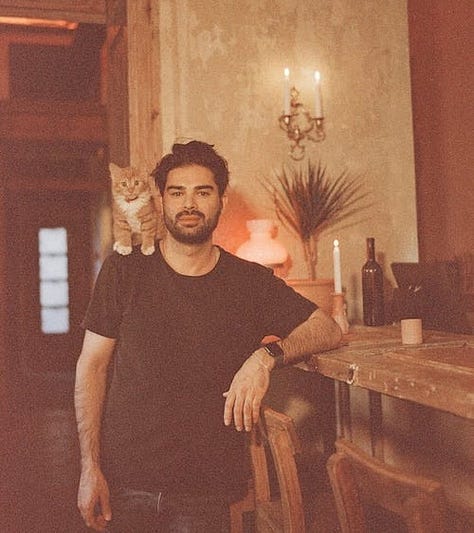
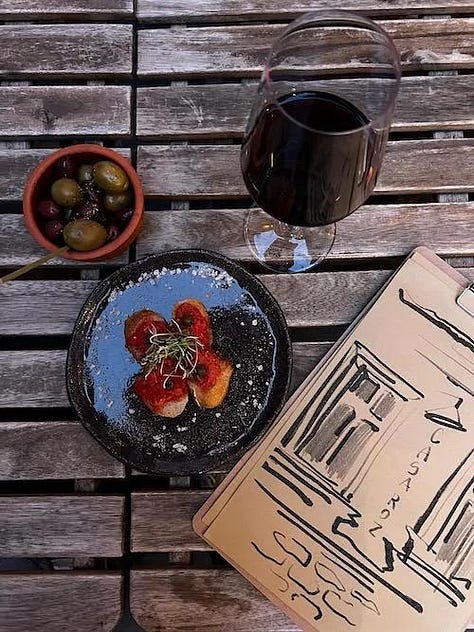
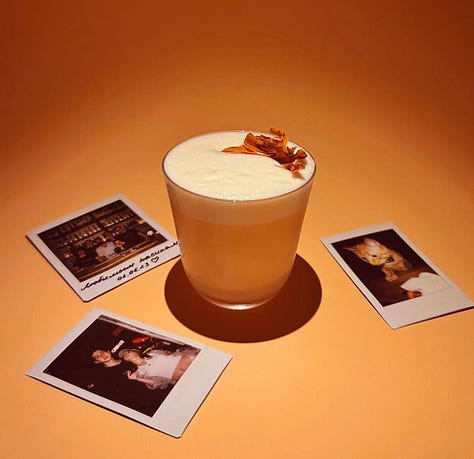

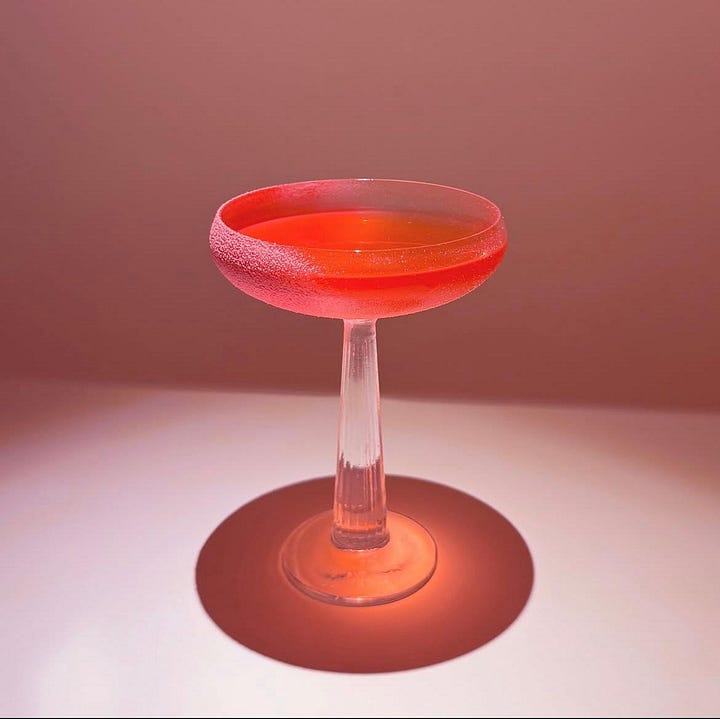
Victor
The young entrepreneur that creates this warm sense of place is Victor Savcenco. The eldest of 4 children recalls his tender years: “As a big family, a beautiful tradition that we all valued and loved was dinner. It was a time that we all loved spending together. The food we shared resonates as a core memory of happy times. I think that our childhood memories motivate us.”
Victor left his home country behind for the first time as a teenager. A foreign exchange student in high school, he stayed on to attend college in California—achieving a business degree that led him into real estate and beyond, even as far as a taco truck venture. All the while, he remembers, he was dreaming…about going home and opening a wine bar.
Homecoming
On July 17, 2025, Victor and I sit down for a chat inside Casaroz (Victor’s invention combining words in Romanian, for pink house). He remembers the date as a personal milestone. Exactly 3 years before, he had returned to Moldova.
”When I came home, I was searching for an old cellar. But then I came across this gem, this beautiful space,” he says. It always bothered Victor that a city filled with so much history, didn’t let its age show. Most of the old buildings are not as exposed as the one he chose for his bar. When he found the property, he purposefully leaned into its layers and textures. “I wanted to create a space that people would appreciate. When they come here, we invite them into a different era, a different time. They leave reality at the door and enter a world that feels far away. You might be in Spain, in a little city. You might be in Cuba,” he proposes.
Indeed, Casaroz gives off an intimate Latin vibe, with vintage mirrors, curved alcoves, curios and candles. Most of the tiered patio at the entrance is open to the sky. Inside, rooms are cast in the rosy glow of a few neon light rods. The scarred walls are painted fleshy tones, imbued with a sense of vulnerability. A small tapas menu and an inventive drink menu complete the sensory experience.
Who finds their way to Casaroz? In the beginning, he wasn’t sure, but Victor had a notion that the bar would attract people like him that travel the world. They would appreciate the bar’s hole-in-the-wall character, modeled after one he’d discovered in Barcelona. “I see those people. I know those people. They appreciate places where you can feel time,” he tells me.
Chinatown Phenom
Also top of mind for Victor was a phenomenon he’d discovered in historic Chinatowns along the West Coast and in Hawaii. Neighborhoods teaming with commerce during the day that went quiet and still in the evening. He’d noticed how interesting bars and restaurants tended to pop up in empty buildings nearby.
“So why not have a place similar to that back home?” he thought. Chișinău’s Chinatown is the Central Market. Casaroz sits on Strada Columna—from early morning, a throughway for those selling and buying gadgets and tools, shoes and clothes, fruit and vegetables. But at 6:00 PM, the market shuts down and the neighborhood empties out. “That’s when we open,” he says. “You get to enjoy the beautiful quiet street. You get to enjoy Casaroz.”
Admittedly, I’ve walked right by this modest haunt more than once. The place is mysterious at night. “People used to live here,” Victor reminds me. “We still treat it as a home. For me and my staff, the people that walk in are welcomed as house guests. We are polite, but we’re not very formal. We talk with our guests. We joke. We make friends. We share a vision we believe in.”

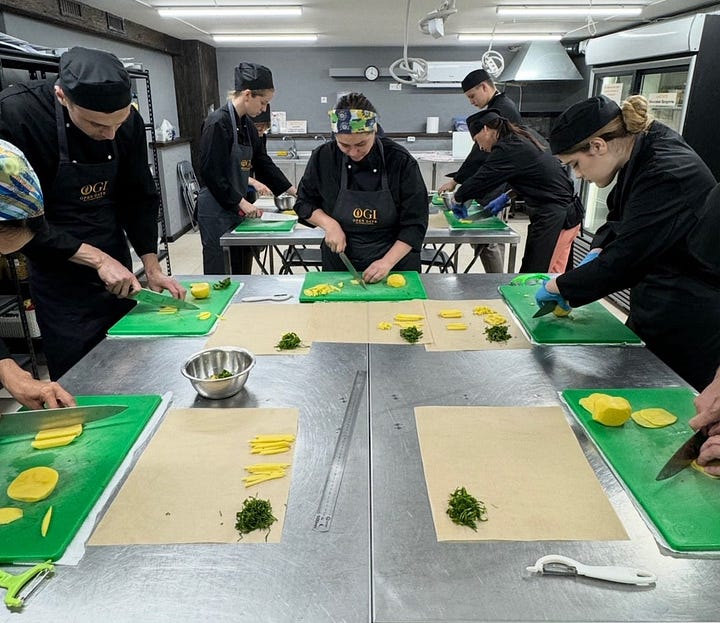
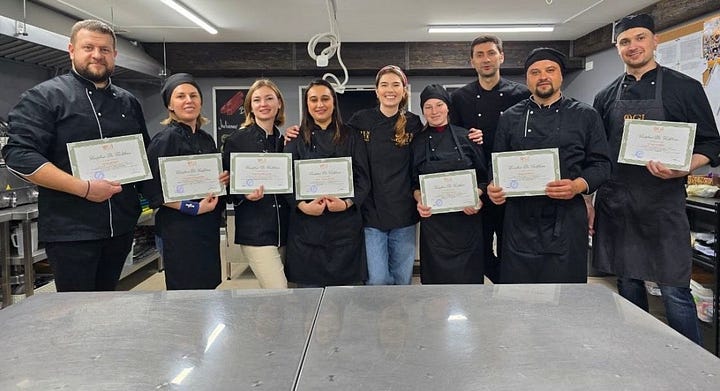

Julia
Victor’s sister Julia Smith has no doubt about what compels her to create in the kitchen. Growing up in a family that communed around a dining table has absolutely everything to do with her passion for hospitality and the culinary arts.
“We grew up in a home where amazing food was always on the table. There was never a boring dinner or table setting. We were surrounded by beauty, by good food, by a lot of guests that were welcomed in our house all through our childhood. So yeah, definitely—our family, my parents, are very much responsible,” she remembers.
Chef!
At the age of 17, Julia journeyed to the United States herself. She chose a 3-year degree program at American River College. Her study of restaurant management and culinary arts involved practical experience in the restaurant on site. Managers, waiters, chefs, line cooks—all were students. To graduate, she had to learn every facet of a fine dining experience. The space was in no way a Moldovan cantina (cafeteria-style eatery).
Julia returned to Chișinău with top-shelf credentials. But coming home was not the triumph she had imagined: “I was this 19-year-old kid with a culinary arts and restaurant management degree. I was sending my resume to a bunch of different restaurants. Nobody replied.” She landed her first job at Toucano’s, a popular center-city coffee shop. She hasn’t forgotten her disappointment—“They didn’t care where I studied. They didn’t need my experience. They just needed a person to work a shift.”
Someone suggested that Julia speak to the two Americans who were preparing to open Smokehouse, Moldova’s first-ever American-style barbecue restaurant, with a local partner. They were looking for an English-speaking chef. She applied for the position of kitchen helper. “Because obviously, my self-esteem was at rock bottom. They called me for an interview. When I went in and they heard my story, they asked if I would like to be the chef!” she recalls. Julia found the idea ridiculous: “You need to begin as a help, then a line cook. Then maybe you become a sous chef. If you’re very lucky, you become a chef. So, of course, I was startled, but I turned out to be pretty okay at being in charge of the kitchen and the menus. I believe Smokehouse was a success because of the whole team. And I played a part in that.”
In 2018, Julia began guiding the culinary division of a nonprofit known as Open Gate International Moldova. She teaches cooking and builds training programs to create employment opportunities for the community they serve. Julia has trained and mentored more than 500 students, many of them women. “We had a unique advantage: being completely independent from the post-Soviet educational system,” she shares. “Our program was far better suited to the modern world and to contemporary restaurant culture.” In 2021, the NGO established a private cooking school to sustain their mission. That’s where her younger brother Gri had his first formal learning experience in the kitchen.
Dream House
A couple of years after Julia started working at Smokehouse, she found herself in conversation with David Smith, one of the owners.1 Managing the front of the house, he had often sat at the bar pounding away on his laptop. They seriously clicked. David and Julia just celebrated their seventh anniversary. Looking back, she remembers how their wedding invitation featured a unique gift registry: ”Guests were encouraged to fund a dream we’d had for years. We had started this adventure—going village by village across Moldova to find the ‘Village of the Year.’”
Their treasure hunt led them to a traditional home in an enterprising community only 45 minutes by car from Chișinău. “When we started retrofitting the house, we quickly realized this had to be more than just a dacha (Russian, for country house). The place is designed to host an experience. We could present a 7-course dinner today, host a masterclass tomorrow and team building next week. David and I are developing a culinary newsletter and planning events. I want the space to be alive, dynamic, and constantly filled with people, ideas, and creativity. In short, our kitchen will never be bored or lonely!”
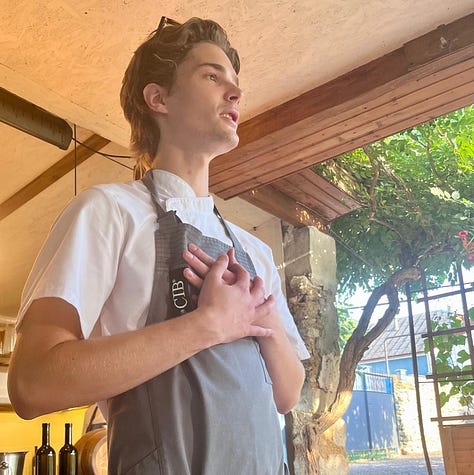
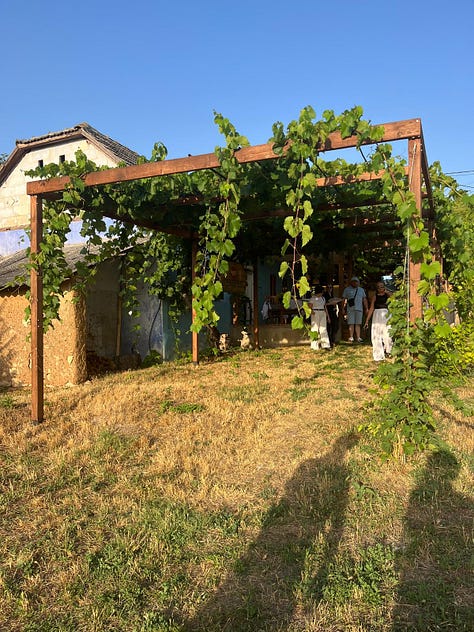
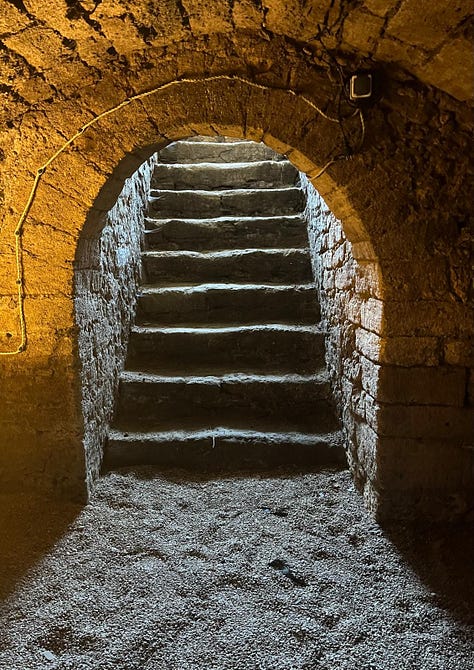
Gri
As I write, Julia’s brother Gri Savcenco is conjuring the sophisticated dinners that his big sister envisioned. Gri graduated from a culinary institute in Barcelona a few months ago. The family has come together around his desire to create a Michelin-star dining experience in Moldova. Julia and David’s village house is the stage for the concept he calls Fuera (Spanish, for outside). On the night I visited, Julia was Gri’s sous-chef. David, the dishwasher. Gri’s girlfriend Valea, the server. Victor provides the wine and Gri made the cherry liqueur.
On a simmering hot summer day, I took a taxi to Pohrebea to taste for myself. David was there to greet me and give a tour of his charming hilltop home and a little wine cellar carved out of the sloping land below. Beneath the vine-covered arbor that runs the length of the terrace, I joined 8 other guests around a long table. Our perch overlooked an expanse of forest and farmland. A sliver of the Dniester River shimmered beyond the trees.
Gri invited me to sit in the chair nearest the open-air kitchen, the better to watch as each course came to life. The only vegetarian and non-Russian speaker, I would enjoy the pleasure of our chef’s personal attention all evening.
Arms outstretched, Gri welcomed us and shared his vision for the evening’s repast. As the amuse-bouche (French, for appetizer) was served, he turned to thank me for requesting a special menu (pescatarian/vegetarian). “For me, it’s a way to feel more creative, a way to exit my comfort zone,” he smiles. “For you today, we’ll make a very special combination of tastes.”
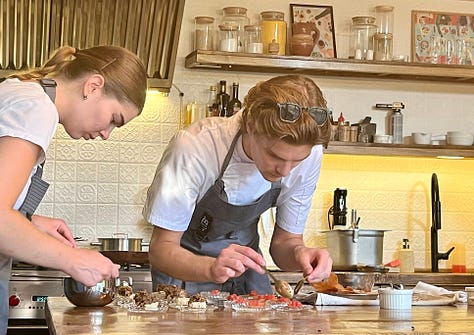

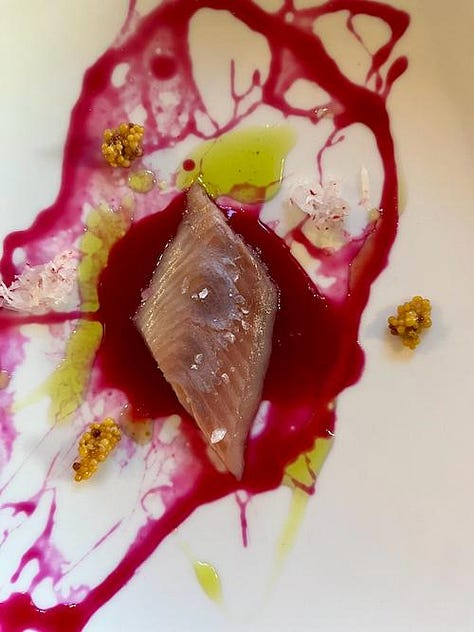
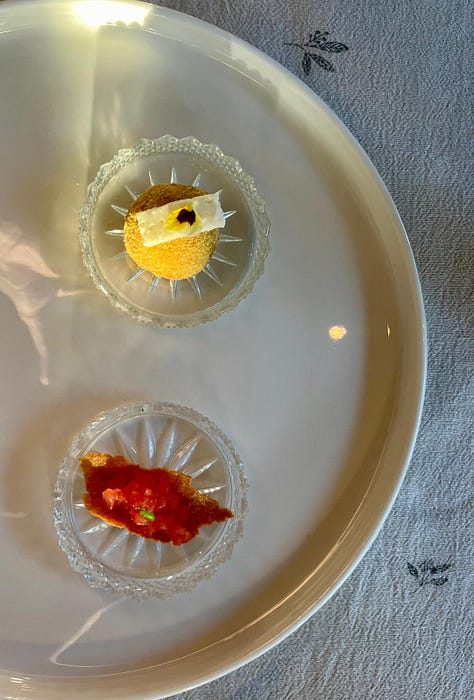
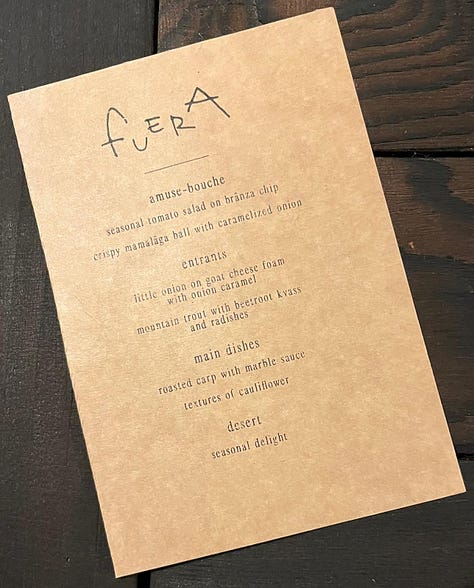
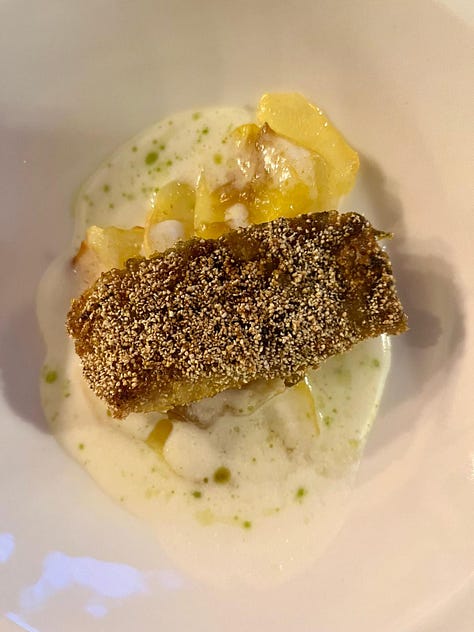

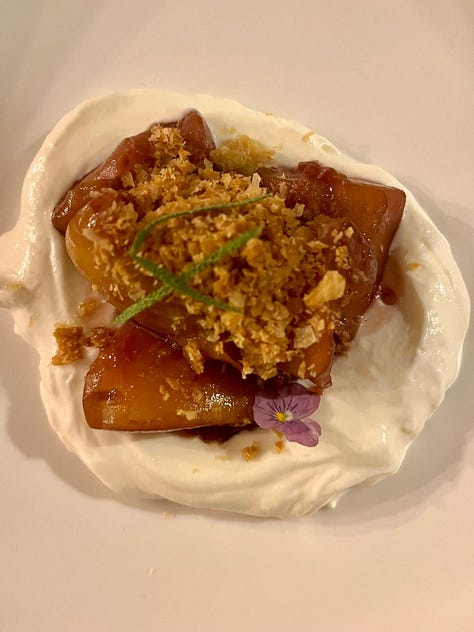
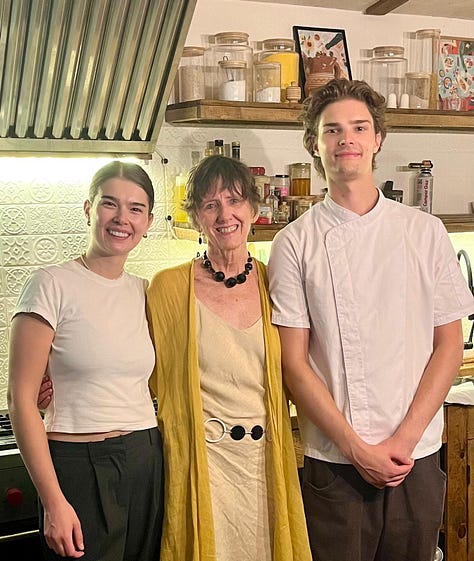
Storied and savory
From the first to the last, each dish transformed ordinary ingredients into subtle flavors. Gri’s menu was filled with “summer tastes we all know and love.” Local sunflower oil drizzled over minced homegrown tomatoes. Mamalaga (Moldovan-style polenta) translated into a crunchy fraze. A carmelized onion ringed in goat cheese foam sourced from the farm next door. Julia’s homemade sourdough focaccia with herbed butters.
Chef Gri introduces each course with a story like this one:
So let me introduce you to the Mountain River Trout. The trout comes from the mountains of Romania. With the warm weather that we are having right now in Moldova, I wish I was a fish swimming there. We pressurize it at a low temperature to not break any proteins in the meat.
The fish will still have this raw color, but the texture is amazing. It will break under a fork. And we serve it with green oil and marinated mustard seeds…I will tell you a little story about these radishes: We grate the radishes. When we take out the juice, suddenly, the radish becomes very smooth. A very cute little pink vegetable…Please enjoy, mix everything and be amazed.
After a break to take in the sunset, the dinner continued to unfold, with carp au gratin and a roasted cauliflower steak, made especially for me. Dessert floated out—brandied peaches on a cloud of crème fraiche. For the finale, Gri invited us down into the candlelit cellar for a sip of his cherry liqueur.
In the quiet darkness, Gri talked about how he came to this place. “I think family is the most important part in all of this. It’s not only that this is my sister and my brother-in-law’s house. It’s also the support that I have been given throughout my history, throughout my life. Every crazy idea I introduced to them, they understood. They are with me all the time and with their help, I get better every day.”
Find out more: Casa Roz | Fuera
My views do not necessarily reflect the opinions of the Peace Corps or the U.S. government.
About David Smith: In 2012, David arrived in Moldova as a Peace Corps volunteer in community development. He stayed on to pursue entrepreneurial interests with local partners and married Julia Savcenco in 2018. In 2021, he began writing about Moldova on this platform. Moldova Matters delves into the local economy and politics. Fools & Foreigners shares perspectives on travel and life abroad. My Moldova stories are occasionally cross-posted in his journals. In August 2025, David Smith became a citizen of Moldova.


